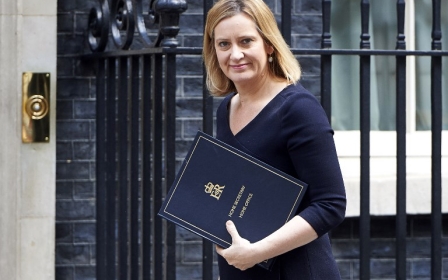East London Muslims urge action after spike in acid attacks

British Muslims living in east London have demanded action from police and local authorities after a spate of acid attacks sparked warnings and left many feeling scared and vulnerable.
The concerns are being raised as police reported an attack on two people in Mile End in the early hours of Tuesday, only days after Resham Khan, 21, and her cousin Jameel Mukhtar, 37, were left permanently disfigured after acid was squirted through their car window in nearby Newham.
That attack led to reports on social media of further incidents against Muslims in east London.
While some were not being considered "hate crimes" by the police, the reports spread panic among Muslims and allegations of a lack of response from the local authorities.
At a well-attended community event on Sunday, Tower Hamlet's mayor John Biggs attempted to reassure local residents who were panicking about the spate of acid attacks.
Community fears
Farzana Uddin, a resident who attended the meeting with Biggs and local leaders, said that many used the gathering to voice their anger at the situation and the lack of faith they had in the local authorities.
"In terms of police protection, there's a huge level of mistrust and lack of confidence in what they can do for us," said Uddin. "This perception wasn't helped by the local police commissioner not showing up.
"It just added fuel to the fire and made people feel that the police weren't committed to tackling the issue."
Biggs told MEE that the spate of acid attacks in East London was "concerning" and that the council was "working with the police to ensure residents are kept safe."
Uddin, who lives a few minute away from where an acid attack took place in Tower Hamlets, said that many people had sent her messages on how to administer first aid to victims on WhatsApp.
Figures released two months ago showed that the number of acid attacks in London had soared over the past six years - 431 in the last year alone compared to 1,500 between 2011 and 2016.
Tower Hamlets had the third highest number of acid attacks after Barking and Dagenham and Newham.
'Close to home'
Hajera Begum, a lifelong resident of Tower Hamlets, also told Middle East Eye that a panic had ensued within the community after the attacks took place.
"Many women in my family and the area were scared to travel alone even during the day," said Begum. "Some went as far as rolling up their car windows in case someone threw acid on their faces."
She added: "The local authority know that people are panicking and should have released a statement to reassure local residents that they are doing what they can to catch the perpetrators but instead they're met with silence.
"All the while there is a constant stream of WhatsApp messages being shared that is causing a level of hysteria."
Begum has been involved in an online project to try and document the spate of acid attacks reported on social media.
WhatsApp messages
But unlike other acid attacks, the use of social media had a big role to play in disseminating information about the incidents as they became more prevalent over the course of the week.
This sense of panic escalated after a print-screen was disseminated via social media of a secondary school headteacher urging his staff members to "remain vigilant" after a teacher was reportedly attacked with acid outside the school.
Jahirul Miah, who attends the school, told MEE that students were shocked to hear about an incident taking place outside the school.
"We were very shocked to be honest since we've been hearing stories all over recently, but we never heard it this close, like right outside our school, no one expected that," said Miah.
"[The] school hasn't told students anything, and we had to ask a teacher who didn't tell us much."
MEE is not able to independently verify whether an attack did take place outside Stepney Green school in east London. Paramjit Bhutta, the school's headteacher, refused to comment on the email he sent.
Middle East Eye propose une couverture et une analyse indépendantes et incomparables du Moyen-Orient, de l’Afrique du Nord et d’autres régions du monde. Pour en savoir plus sur la reprise de ce contenu et les frais qui s’appliquent, veuillez remplir ce formulaire [en anglais]. Pour en savoir plus sur MEE, cliquez ici [en anglais].




